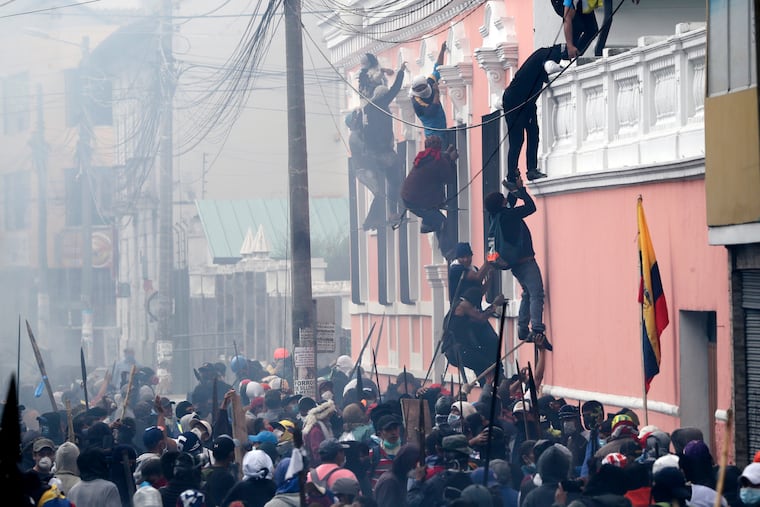Outcry over Penn visiting scholar raises question: How should universities handle controversial figures?
The selection of Ecuadorian politician María Paula Romo for an unpaid research appointment at the university's Center for Latin American and Latinx Studies drew backlash online.

Tulia Falleti, director of the University of Pennsylvania’s Center for Latin American and Latinx Studies, knew her fall-semester pick for visiting scholar would be controversial.
That choice was María Paula Romo, an Ecuadorian professor, lawyer, and politician whose resumé is also marred with accusations of human-rights violations. Police under her purview allegedly used excessive force to quell Ecuadorians protesting austerity measures in 2019. Romo was dismissed from her post but has denied any constitutional violations.
“In no way I expected this level of mobilization,” said Falleti, referring to an August online petition — now 12,000 signatures strong — demanding Romo be dropped from the unpaid research appointment.
Romo’s role at Penn speaks to a larger philosophical question for universities: How should an institution handle controversial figures?
Falleti said she stands by the appointment and Romo will be allowed to finish her semester as visiting scholar, which ends Dec. 22. But Falleti admits Romo’s semester has fallen short of its potential. Typically visiting scholars take part in center events to discuss and promote their work. Romo hasn’t because having her engage with the Penn community would have come “at a very high cost,” Falleti said.
The pushback has prompted at least one change in the visiting-scholar application process. Future applicants will have to include a recommendation from a Penn faculty member, said Falleti.
Falleti said she personally disagreed with Romo’s government but found merit in Romo’s proposed research into challenges facing democracy in Latin America, “including socio-economic inequality, the role of social media, corruption and populism, particularly in the period immediately prior and during the pandemic.”
Falleti believes it’s her job to bring different perspectives to campus, even if unpopular. It’s why she invited former Brazilian President Dilma Rousseff to Penn after she was impeached over alleged corruption.
Universities frequently have grappled with free-speech issues surrounding controversial figures, often involving a guest speaker who had said something viewed as inflammatory.
For example, the Massachusetts Institute of Technology canceled a lecture this semester after students learned the speaker had criticized efforts to promote diversity, equity, and inclusion on college campuses. Conversely, Penn State held that it had an obligation to protect free speech as a public university and allow a student organization to host right-wing figure Milo Yiannopoulos.
Ken Paulson, director of the Free Speech Center at Middle Tennessee State University, says Penn’s situation is different because a private university has more latitude over whom it invites on campus.
How we got here
In October 2019, thousands of Ecuadorians took to the streets to protest a plan to end 40-year-old fuel subsidies. While most demonstrators were peaceful, there were some looting and clashes with national police. Authorities responded with water cannons and fired expired tear gas at demonstrators.
Human-rights watchdogs would later say police repressed protests through “excessive force” and they expressed concern over arbitrary arrests. Human Rights Watch would report police were responsible for at least four protester fatalities.
While Romo later apologized for the teargassing, Ecuador’s National Assembly would censure and dismiss her in 2020 for the police response.
Romo, who did not respond to requests for comment, has previously said she fulfilled her duty to protect citizens during the unrest.
Falleti said she knew this background when picking Romo, determining that Romo’s time as a congresswoman and role as a delegate in Ecuador’s 2008 constitutional convention outweighed her role in the protests. Most of the criticism, Falleti added, seemed to be coming from outside of the university.
Falleti said it wasn’t for her to judge how Romo, who reportedly could face judicial proceedings, handled demonstrations.
“That’s for the courts to decide whether or not she was guilty. So far, she has not been found guilty of any wrongdoing,” said Falleti.
For Julie Gamble, a former postdoctoral fellow at Penn’s Perry World House and urban studies professor currently living in Ecuador, the Romo appointment was a social justice issue. She’s been speaking out against the appointment and argues Penn “legitimized Romo by maintaining an association with her.”
Gamble is among critics who say that while some of history’s most nefarious characters might offer different perspectives, that would be no reason to bring them to campuses.
In a September letter, Gamble and three other academics with former ties to Penn asked Falleti to reconsider the appointment. The letter prompted a renewed look at Romo’s tenure as interior minister. During Penn’s investigation, Romo’s biography was removed from the center’s website.
While Penn would find no reason to rescind Romo’s appointment, the biography didn’t go back up until after Gamble cowrote an op-ed in the Daily Pennsylvanian, Penn’s student newspaper, last week. Gamble and more than 50 other academics accused Penn of essentially hiding Romo’s appointment by failing to promote her presence. The academics demanded to know the process for picking a visiting scholar and why the center had taken down Romo’s biography despite keeping her appointment.
Falleti said the biography oversight was due to a staffing shortage.
What happens now?
Falleti wants to salvage what she can of Romo’s appointment. She wants to hold an event with Romo and Yaku Perez, former Ecuadorian presidential candidate and Indigenous environmental activist, next year. Romo has expressed interest, according to Falleti.
The center might also establish a waiting period for policymakers leaving office before they can apply for the visiting-scholar position.
Paulson, with the Free Speech Center, said Penn officials might not have had a free-speech issue on their hands but they certainly had an academic philosophy question worth exploring.
“What do you believe should take place at a university and what are your standards going to be?” he said.